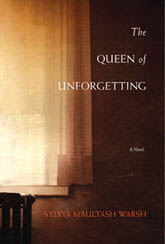
The Queen of Unforgetting
trade paperback $21
June 2010
From mystery to literary intrigue
The mystery genre’s loss is literature’s gain.
Or rather, Toronto writer Sylvia Maultash Warsh’s move into literary fiction with The Queen of Unforgetting, after three compelling and rich whodunits featuring sleuthing doctor Rebecca Temple, is a gain for anyone who appreciates good writing of any kind.
The Toronto writer’s first non-mystery novel is, however, still driven by questions: Why is U of T grad student Mel Montrose hiding her family background? What hold does a stalking former lover have over her? Why is she hiding out for the summer as a guide in a reconstructed pioneer fort in northern Ontario?
And why is she always going on about martyred missionary Jean de Brébeuf? Montrose is supposed to be preparing her dissertation on E.J. Pratt’s epic poem on the missionary. She’s discussed it with the renowned Northrop Frye no less, whom she’s trying to impress into being her thesis advisor. Yet here she is mucking about in an historical site, writing in her head a different account of Brébeuf’s ignorant, violent and doomed relationship with the native people.
You might be getting the idea this novel is rather an academic exercise. In the early going I started to dread it was shaping up as another dreary story of intrigue in the English department. But The Queen of Unforgetting just uses that material as a base from which it quickly veers off into other more personal and social directions. The novel especially comes alive when Montrose connects with a small girl in a town near the fort and reconnects with her Jewish parents whose lives have been defined by having survived the Nazis.
The Holocaust is a theme actually treated more deeply in Warsh’s third Temple mystery, Season of Iron. Here it’s just one of many elements Warsh effectively brings together to reveal her conflicted, and often maddeningly confusing, heroine.
Yet she has a light touch. Not comic by any stretch, but with a direct style of writing that doesn’t try to be densely literary, and lays out the story directly and creatively, while leaving the heavy analysis to the reader.
The story lets down a little toward the end, when Mel Montrose’s personal situations are all worked out—too neatly perhaps—and she returns to her academic quandary for an anticlimactic resolution that the reader saw coming all along. But that’s all right. We’ve grown on the voyage of unforgetting to be forgiving of small mercies.
— Eric

